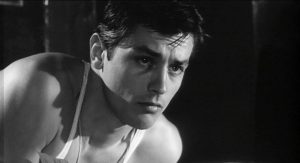
10 Essential Movies to Watch by Marc Eliot 6.Rocco and his Brothers (1960) by Luchino Visconti
6.Rocco and his Brothers, directed by Luchino Visconti. Italian/French (1960).
Visconti was one of the giants of the post-war Italian cinema’s era of Neo-Realism. This powerful family drama is the clear inspiration for the best films of both Martin Scorsese and Francis Ford Coppola. There is no Raging Bull without Rocco and his Brothers, or any of the three Godfather films.
Rocco is a family saga that depicts several generations of a ‘40s Milan family. Each of the five brothers has a separate but related story that all come together in the end. The great black-and-white stylistics of Visconti are on full display in what rightly may be called an epic class-struggle, viewed through the lens of Visconti’s individual brand of sexism and brutality.
The film’s grandest revelation is the discovery and celebration, really, of French actor Alain Delon, himself the product of a rough childhood and teen years spent as a street delinquent. Delon’s physical beauty first captivated Visconti, who was gay, and the version of Delon he put on the screen is truly breathtaking.

Alain Delon as “Rocco”
Delon was hailed at the film’s release as the new James Dean, Marlon Brando and Montgomery Clift, all rolled into one, and he more than met that challenge. His portrayal of Rocco, the brother who eventually gains fame as a prize-fighter, remains one of the triumphs of all Italian cinema.
As for the style of the film, by placing the camera inside the ring Visconti offered a tutorial in how to film a prize fight, well studied by Scorsese, who copied the technique for Raging Bull, and borrowed from Delon’s Rocco to help shape De Niro’s tough-guy portrayal of Jake LaMotta (but without Delon’s tenderness, Rocco’s redemptive quality, De Niro’s Raging Bull remains hopelessly and morally two-dimensional).
The film’s family saga also foretells Coppola’s great Godfather trilogy. Finally, stylistically, Neorealism is a series of films that appear to be documentaries but are actually carefully scripted and precisely directed stories.
Rocco and his Brothers is one of my favorite films, and Delon remains high on my list of great actors. He was pretty, no doubt, but manly and rough-cut that made him universally appealing, but never soft or weak onscreen. Rocco was his springboard to enjoy a long and wonderful career, including starring in Rene Clement’s French Purple Noon, also 1960, based on Patricia Highsmith’s novel that was remade in English in 1999 by the late Anthony Minghella as The Talented Mr. Ripley (I prefer the Clement version), but no performance in Delon’s long list of achievements ever surpassed his Rocco Parondi in Visconti’s landmark Rocco and his Brothers.
More content from Marc Eliot at the UFM Film School:
- Teaching an Auteurist Approach to Cinema for Film Students at the UFM Film School
- Artista Emprendedor: The Business of Hollywood con Marc Eliot
Stay tuned for next week’s recommendation!








